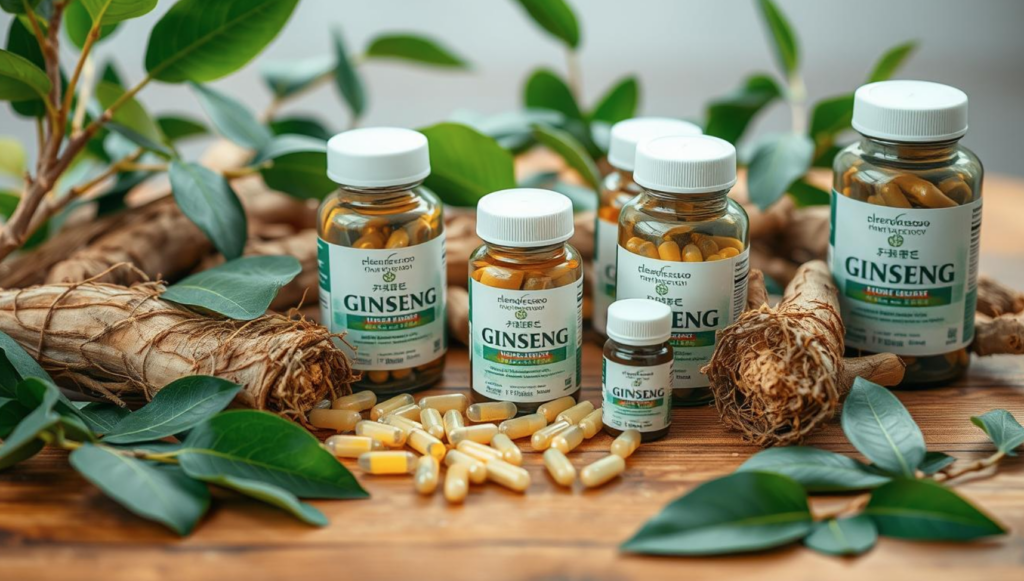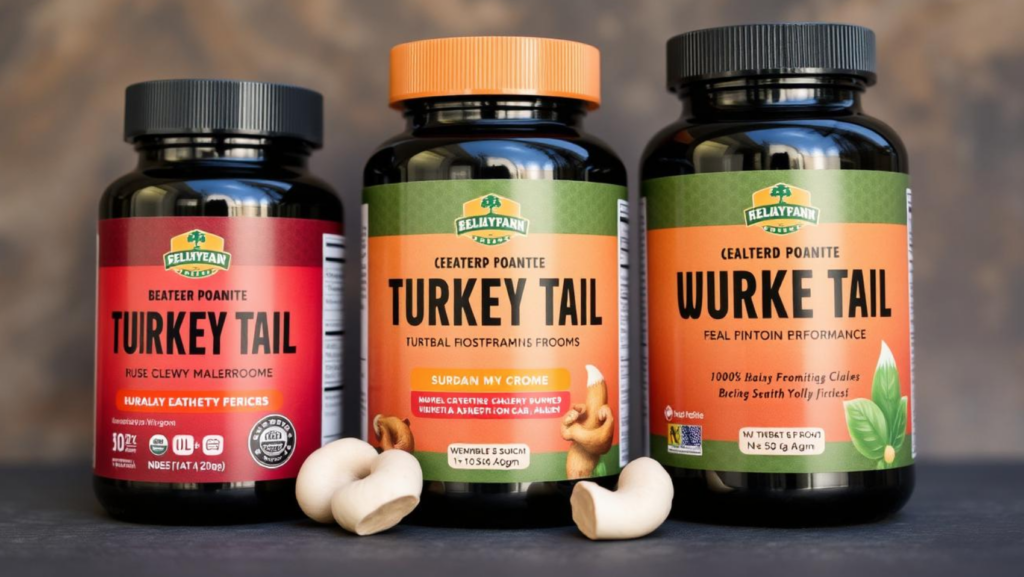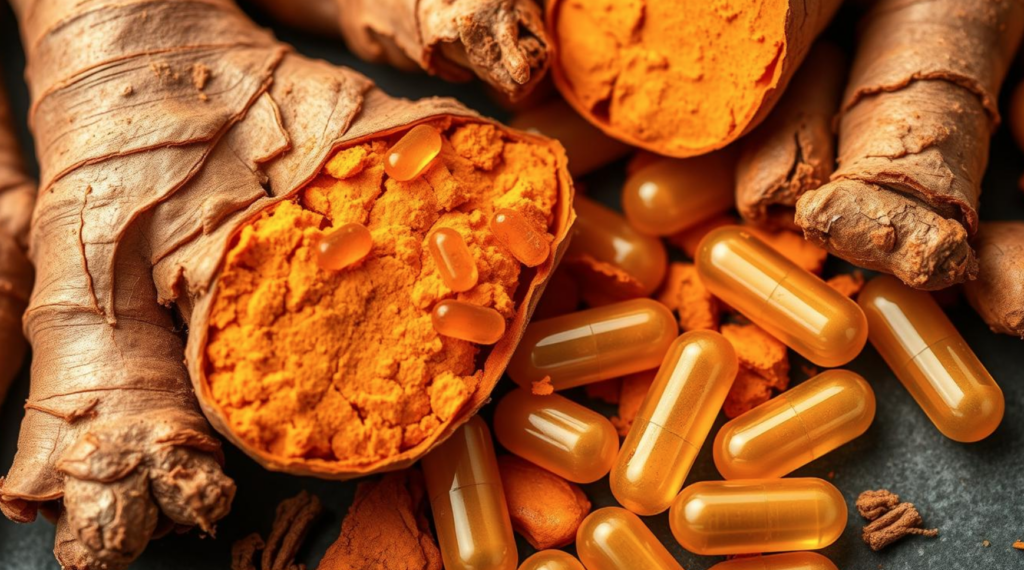Athletes often push their bodies to the limit, leading to increased stress and potential fatigue. The body’s response to this stress can impact overall health and athletic performance. Adaptogens, a unique class of herbs and botanicals, have been used for centuries to help the body adapt to various stressors.

These natural supplements offer a promising approach to restoring balance to the body’s stress response system. By enhancing the body’s resilience, adaptogens can help mitigate the negative effects of intense physical activity on the body.
The benefits of incorporating adaptogens into an athlete’s regimen include improved recovery and enhanced overall well-being. As research continues to uncover the potential of these botanical allies, athletes can leverage their benefits to gain a competitive edge.
Table of Contents
Key Takeaways
- Adaptogens help the body adapt to physical and emotional stressors.
- These natural supplements can restore balance to the body’s stress response system.
- Athletes can benefit from improved recovery and enhanced resilience.
- Incorporating adaptogens into a training regimen can support overall health.
- Research continues to uncover the potential benefits of adaptogens for athletes.
Understanding Adrenal Fatigue in Athletes
Adrenal fatigue is a condition that significantly impacts athletes, affecting their performance and overall well-being. It occurs when the adrenal glands are overworked due to prolonged exposure to stress, whether physical, emotional, or environmental.

What Is Adrenal Fatigue and How It Affects Athletic Performance
Adrenal fatigue is characterized by the adrenal glands’ inability to produce adequate hormones, particularly cortisol, in response to stress Cortisol is crucial for energy regulation, metabolism, and immune function. When cortisol levels are imbalanced, it can lead to decreased performance, prolonged recovery times, and increased susceptibility to illness.
Cortisol, being a catabolic hormone, stimulates the breakdown of muscle if left unchecked, potentially negating the benefits of training. Understanding the impact of cortisol on the body is essential for athletes to manage their training and recovery effectively.
Signs and Symptoms of Adrenal Fatigue in Athletes
Athletes experiencing adrenal fatigue often report several key symptoms. Persistent fatigue that doesn’t improve with rest is a hallmark, often accompanied by a feeling of “hitting a wall” during training. Other signs include sleep disturbances, such as difficulty falling asleep or waking unrefreshed, and increased recovery time between workouts.
- Performance plateaus or unexpected declines despite consistent training.
- Increased recovery time between workouts, with muscles remaining sore and tired for extended periods.
- Decreased immunity with frequent illnesses.
- Salt and sugar cravings, decreased motivation, irritability, brain fog, and reduced ability to handle stress.
Recognizing these symptoms is crucial for athletes to address adrenal fatigue and mitigate its effects on their performance and overall health.
The Science of Adaptogens for Adrenal Fatigue in Athletes
The science behind adaptogens reveals their potential in combating adrenal fatigue in athletes. Adaptogens are natural substances that help the body adapt to various stressors, including physical, emotional, and environmental factors.
What Are Adaptogens?
Adaptogens work by regulating the body’s stress response system, primarily the hypothalamic-pituitary-adrenal (HPA) axis, which plays a crucial role in managing stress and maintaining homeostasis. Unlike stimulants, adaptogens modulate stress responses, providing a balanced and sustained effect.
How Adaptogens Regulate Stress Response
Adaptogens help restore normal HPA axis function by modulating stress hormone production and receptor sensitivity. This creates a more balanced physiological environment for training adaptations and enhances the body’s ability to respond to exercise-induced stress.
The HPA Axis and Athletic Performance
The HPA axis serves as the body’s primary stress management system, regulating energy availability during exercise and recovery. During intense training, the HPA axis activates to release cortisol, which mobilizes energy resources. However, chronic activation can lead to dysregulation and impaired performance. Athletes with optimal HPA function demonstrate better adaptation to training stimuli and more efficient recovery between sessions.
How Adaptogens Work in the Athletic Body
In the context of athletic performance, adaptogens work by optimizing the body‘s energy production and utilization pathways. This optimization is crucial for athletes seeking to improve their endurance and reduce fatigue during prolonged exercise.
Modulating Cortisol Levels
Adaptogens help modulate cortisol levels, which is essential for maintaining a healthy stress response. Elevated cortisol levels over prolonged periods can lead to adrenal fatigue, negatively impacting athletic performance. By regulating cortisol, adaptogens enable athletes to manage stress more effectively and maintain optimal function.
Enhancing Energy Production and Oxygen Utilization
Adaptogens have shown promising effects on energy production and oxygen utilization, both of which are essential for endurance athletes. Rhodiola rosea, for instance, enhances mitochondrial function and increases the production of adenosine triphosphate (ATP), the energy currency of cells. This leads to improved endurance and reduced fatigue during prolonged exercise.
Several key mechanisms underlie the benefits of adaptogens for athletes:
- Enhancing cellular energy production by improving mitochondrial efficiency.
- Increasing the production of ATP by up to 24.5% in muscle cells, as shown in various studies.
- Improving oxygen utilization by increasing red blood cell production and enhancing the oxygen-carrying capacity of the blood.
By optimizing bothenergyproduction pathways and oxygen delivery systems,adaptogenscreate a synergistic effect that allows athletes to train harder, recover faster, and perform at higher intensities before reaching fatigue thresholds.
Top Adaptogens for Athletic Performance and Recovery
Certain adaptogens have been found to be particularly effective in enhancing athletic performance and speeding up recovery. These natural substances have been used for centuries in traditional medicine and are now backed by modern research and studies.
Rhodiola Rosea for Endurance and Fatigue Reduction
Rhodiola Rosea is an adaptogen that has been shown to improve endurance and reduce fatigue in athletes. It achieves this by regulating the body’s stress response and improving mental performance under pressure.
By incorporating Rhodiola Rosea into their supplementation regimen, athletes can experience improved exercise performance and faster recovery times.

Ashwagandha for Stress Management and Cortisol Regulation
Ashwagandha is another powerful adaptogen that helps athletes manage stress and regulate cortisol levels. High cortisol levels can lead to fatigue and decreased performance, making Ashwagandha a valuable addition to an athlete’s supplementation plan.
By reducing stress and cortisol levels, Ashwagandha enables athletes to perform at their best during exercise and recover more efficiently.

Ginseng for Improved Circulation and Oxygenation
Ginseng is known for its ability to improve circulation and enhance oxygenation, both of which are critical for optimal athletic performance. By improving blood flow and oxygen delivery to the muscles, Ginseng helps athletes perform better and recover faster.
This adaptogen is particularly beneficial for endurance athletes who require sustained energy levels during prolonged exercise activities.

Cordyceps for Energy and Stamina
Cordyceps is a medicinal mushroom that has gained popularity among athletes for its ability to increase energy and enhance stamina. Research has shown that Cordyceps supplementation can significantly improve exercise performance by enhancing oxygen utilization and ATP production.
Athletes who supplement with Cordyceps report improved endurance, reduced time to exhaustion, and enhanced recovery between training sessions.
Adaptogenic Mushrooms for Athletic Performance
Adaptogenic mushrooms offer a natural and effective way for athletes to boost their performance, recovery, and overall well-being. These fungi have been used for centuries in traditional medicine and are now gaining recognition in the athletic community for their potential benefits.
Reishi for Recovery and Immune Support
Reishi mushrooms are renowned for their ability to support recovery and immune function. By enhancing the body’s natural defense mechanisms, Reishi can help athletes recover more efficiently from intense training sessions. This can lead to improved overall performance and reduced downtime due to illness or injury.

Lion’s Mane for Mental Focus and Cognitive Function
Lion’s Mane is praised for its potential to improve cognitive function and focus. Research has shown that Lion’s Mane extract can increase the expression of nerve growth factor (NGF), a protein that stimulates the growth and repair of neurons. Improved cognitive function and mental clarity can greatly benefit athletes during training and competition.

Turkey Tail for Gut Health and Inflammation
Turkey Tail (Trametes versicolor) offers athletes a powerful tool for managing gut health disruptions and systemic inflammation that commonly accompany adrenal fatigue and intense training. Its unique polysaccharopeptides modulate immune function and reduce inflammatory markers, helping athletes maintain immunological balance. Research shows that Turkey Tail’s prebiotic compounds support beneficial gut bacteria, enhancing the gut-brain axis and influencing recovery processes and stress perception.
Anti-Inflammatory Adaptogens for Exercise Recovery
Prolonged and intense physical activity can induce inflammation, negatively affecting athletes’ performance and recovery. Adaptogens like curcumin and ginger have potent anti-inflammatory properties that can help manage exercise-induced inflammation.
Turmeric (Curcumin) for Inflammation Management
Curcumin, found in turmeric, has anti-inflammatory properties that help control inflammation by regulating various biological processes. Research suggests that curcumin can be as effective as ibuprofen or aspirin in managing inflammation. For optimal benefits, a dosage of 500-1000 mg twice a day is recommended, paired with piperine to enhance absorption.

Ginger for Muscle Pain and Recovery
Ginger contains bioactive compounds like gingerols and shogaols, which have anti-inflammatory and analgesic effects beneficial for exercise-induced muscle pain. Studies show that daily ginger supplementation can reduce muscle pain by up to 25% compared to placebo.

Optimal Dosages and Timing for Athletic Performance
Athletes seeking to harness the benefits of adaptogens must carefully consider both dosage and timing to maximize their performance-enhancing effects. The strategic use of adaptogens can significantly impact an athlete’s ability to perform at their best during exercise and recover efficiently afterward.
General Dosage Guidelines for Athletes
When it comes to supplementation, the dosage of adaptogens can vary widely depending on the specific substance and the individual athlete’s needs. General guidelines suggest that athletes start with a standard dose and adjust based on personal tolerance and performance effects. For instance, Rhodiola Rosea is often taken in doses ranging from 100 to 600 mg per day, with exercise performance benefits observed at the higher end of this range.
- Begin with a conservative dose to assess tolerance.
- Gradually increase the dose as needed and based on individual response.
- Consider the specific adaptogen being used, as different substances have different effective dosage ranges.
Timing Adaptogen Intake Around Training
The timing of adaptogen intake is crucial for maximizing its effects on training and recovery. Research indicates that taking certain adaptogens like Rhodiola Rosea approximately 60 minutes before exercise can enhance acute performance. In contrast, recovery-focused adaptogens such as Ashwagandha and Reishi may be more beneficial when taken post-workout or before bed to support overnight recovery processes.
- For acute performance enhancement, consider taking adaptogens like Rhodiola Rosea about 60 minutes before exercise.
- For recovery-focused adaptogens, post-workout or pre-bedtime intake may be more beneficial.
- Athletes should experiment with different timing protocols during lower-stakes training periods to optimize their supplementation strategy.
Incorporating Adaptogens Into Your Training Regimen
Effective integration of adaptogens into an athlete’s training regimen requires a nuanced understanding of their effects on the body and the system as a whole. Adaptogens can be consumed in various forms, including capsules, teas, or powders added to foods and beverages, offering flexibility in how athletes can incorporate them into their daily routine.
Daily Supplementation Strategies
Athletes can benefit from a consistent daily supplementation strategy. This involves taking adaptogens at the same time every day to maintain a steady level of these supplements in the system. For instance, taking adaptogenic mushrooms like reishi or chaga with breakfast can help in maintaining immune function throughout the day.
Adaptogens in Foods and Beverages
Incorporating adaptogens into foods and beverages is another effective way to consume them. Adding adaptogenic powders to smoothies or soups can enhance their nutritional profile. For example, adding ashwagandha powder to a post-workout smoothie can aid in recovery by regulating cortisol levels and enhancing the body’s response to stress.
Cycling Adaptogens for Maximum Benefit
To avoid desensitization and maintain the efficacy of adaptogens, cycling these supplements is recommended. Common strategies include using adaptogens for 6-8 weeks followed by a 1-2 week break. Some athletes also benefit from seasonal cycling, where the type of adaptogen is changed based on the training phase. This approach helps in keeping the response to adaptogens optimal over time.
By understanding and implementing these strategies, athletes can maximize the benefits of adaptogens, enhancing their performance and aiding in recovery.
Research on Adaptogens and Athletic Performance
The impact of adaptogens on athletic performance has been a subject of increasing research interest in recent years. Studies have investigated various adaptogens for their potential to enhance endurance, strength, and recovery in athletes.
Clinical Studies on Endurance Performance
Research on adaptogens like Rhodiola rosea (RR) has shown promising results in enhancing endurance performance. Recent trials using higher doses (∼1500 to 2400 mg RR/d for 4-30 d) have demonstrated ergogenic effects during sprints on bicycle ergometers and resistance training in both trained and untrained adults.
Research on Strength and Power Output
Research examining adaptogens’ effects on strength and power performance has expanded significantly. A landmark 2023 study published in the Journal of Strength and Conditioning Research found that 30 days of high-dose Rhodiola rosea supplementation (2400mg daily) significantly increased 1-repetition maximum strength in both squat and bench press exercises.
Multiple studies also show that Ashwagandha supplementation can increase muscle strength, size, and recovery in resistance-trained individuals. Research on adaptogenic mushrooms like Cordyceps shows promising results for anaerobic power output.
| Adaptogen | Dosage | Duration | Performance Effect |
| Rhodiola Rosea | 2400mg/day | 30 days | Increased 1-RM strength |
| Ashwagandha | 600mg/day | 8-12 weeks | Increased muscle strength and size |
| Cordyceps | Varies | Varies | Improved anaerobic power output |
The research on adaptogens and athletic performance is promising, with various studies demonstrating potential benefits for endurance, strength, and recovery. As the field continues to evolve, more targeted research will help clarify the optimal use of adaptogens in athletic training regimens.
Potential Side Effects and Precautions
As athletes consider incorporating adaptogens into their regimen, they must also be mindful of the potential side effects and interactions. While adaptogens are generally considered safe, there are certain precautions to be taken to ensure their safe and effective use.
Possible Interactions with Medications
Adaptogens, like any other herbal supplement, can interact with prescription medications and negatively impact health. For instance, certain adaptogens may enhance the effects of blood thinners or diabetes medications, leading to adverse health consequences. It is crucial for athletes to consult with their healthcare provider before adding adaptogens to their supplement routine, especially if they are already taking medications.
Thirdparty testing is also vital to ensure the quality and safety of adaptogen supplements. Athletes should only use products that have been tested by reputable third-party organizations to minimize the risk of contamination or adulteration.
Who Should Avoid Adaptogen Supplementation
Certain populations should exercise caution or avoid adaptogen supplementation entirely due to potential risks or insufficient safety data. The following groups should be particularly cautious:
- Pregnant and breastfeeding women, as safety data is limited and some compounds have traditional contraindications during pregnancy.
- Individuals with autoimmune conditions, who should consult healthcare providers before using immune-modulating adaptogens.
- Those with hormonesensitive conditions, including certain cancers, endometriosis, and uterine fibroids, who should approach adaptogens with hormonal effects cautiously.
- Individuals with blood pressure concerns, who should monitor their response to adaptogens like licorice root that can affect blood pressure regulation.
- Athletes preparing for drug-tested competitions, who should only use third-party tested adaptogen products to avoid supplement contamination.
| Population | Precaution | Reason |
| Pregnant/Breastfeeding Women | Avoid adaptogens | Limited safety data and potential contraindications |
| Individuals with Autoimmune Conditions | Consult healthcare provider | Potential exacerbation of disease activity |
| Individuals with Hormone-Sensitive Conditions | Approach with caution | Potential hormonal effects of certain adaptogens |
In conclusion, while adaptogens can be beneficial for athletes, it’s essential to be aware of the potential side effects and take necessary precautions to ensure safe and effective use.
Holistic Approach: Combining Adaptogens with Other Recovery Strategies
To maximize the benefits of adaptogenic supplementation, athletes must consider a holistic recovery plan that encompasses nutrition, sleep, and stress management. A well-rounded approach addresses the complex interplay between physiological and psychological factors that influence athletic performance and recovery.
Nutrition and Sleep Optimization
Athletes must prioritize a balanced diet that supports their energy needs and aids in recovery. Proper nutrition helps regulate metabolism and supports the body’s natural response to stress. Adequate sleep is equally crucial, as it allows the body to repair and adapt to the demands of training. Ensuring sufficient sleep and a nutrient-rich diet creates a foundation upon which adaptogenic supplementation can be more effective.
Stress Management Techniques for Athletes
Effective stress management is critical for athletes using adaptogens. Techniques such as mindfulness meditation can reduce cortisol levels and improve the body’s response to stress. Other strategies include structured recovery practices like contrast therapy and strategic rest days, which help regulate the autonomic nervous system. By combining these techniques with adaptogen supplementation, athletes can create a comprehensive approach to managing adrenal fatigue and enhancing overall health.
Conclusion
With the demands of modern athletic competition continuing to rise, adaptogens represent a promising natural approach for athletes to optimize their performance and maintain their overall well-being. These powerful herbs and compounds offer athletes a unique ability to modulate their body’s stress response systems, enhancing their energy production, and improving their overall health.
The benefits of adaptogens extend beyond acute performance enhancement to include long-term stress resilience, improved recovery capacity, and enhanced overall health for sustainable athletic careers. Substantial evidence supports the use of Rhodiola rosea, Ashwagandha, and adaptogenic mushrooms across various performance parameters.
Athletes should approach adaptogen supplementation strategically, considering factors such as specific performance goals, individual response patterns, and appropriate dosing protocols. While adaptogens demonstrate remarkable efficacy for many athletes, they work best as part of a comprehensive approach that includes optimized nutrition, sleep, training periodization, and stress management techniques.
As research continues to evolve, athletes should stay informed about emerging evidence while maintaining a critical perspective on marketing claims that may exceed current scientific understanding. With proper implementation, adaptogens can be a valuable addition to an athlete’s training regimen, helping them to optimize their physiological response to exercise and maintain peak performance.







